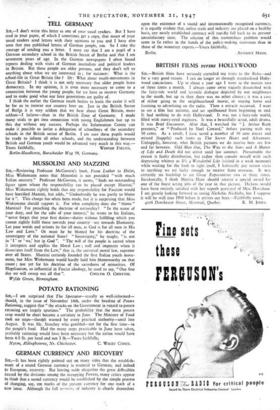MUSSOLINI AND MAZZINI
Sm,—Reviewing Professor McGovern's book, From Luther to Hitler, Miss Wiskemann notes that Mussolini is not provided " with much Italian ancestry." Professor McGovern, it seems, " finds no outstanding figure upon whom the responsibility can be placed except Mazzini." Miss Wiskemann rightly holds that any responsibility for Fascism would have horrified Mazzini, but adds, " Undoubtedly he was partly to blame for it ". This charge has often been made, but it is surprising that Miss Wiskemann should support it. For what complicity does she " blame" Mazzini? For preaching the doctrine of nationality? " In the name of your duty, and for the sake of your interest," he wrote to his Italians, "never forget that your first duties—duties without fulfilling which you cannot rightly fulfil those towards your country—are towards Humanity. Let your words and actions be for 'all men, as God is for all men in His Law and Love." Or must he be blamed for his doctrine of the sovereignty of the national State? " Sovereignty," he taught, "is not in ' I ' or we,' but in God ". "The will of the people is sacred when it interprets and applies the Moral Law ; null and impotent when it dissociates itself from the Law," that is, the universal moral law, supreme over all States. Mazzini certainly founded the first Italian youth move- ment, but Miss Wiskemann would hardly hold him blameworthy on that count ; nor yet for his doctrine of the sacredness of minorities. Of Hegelianism, so influential in Fascist ideology, he used to say, " One fine


































 Previous page
Previous page